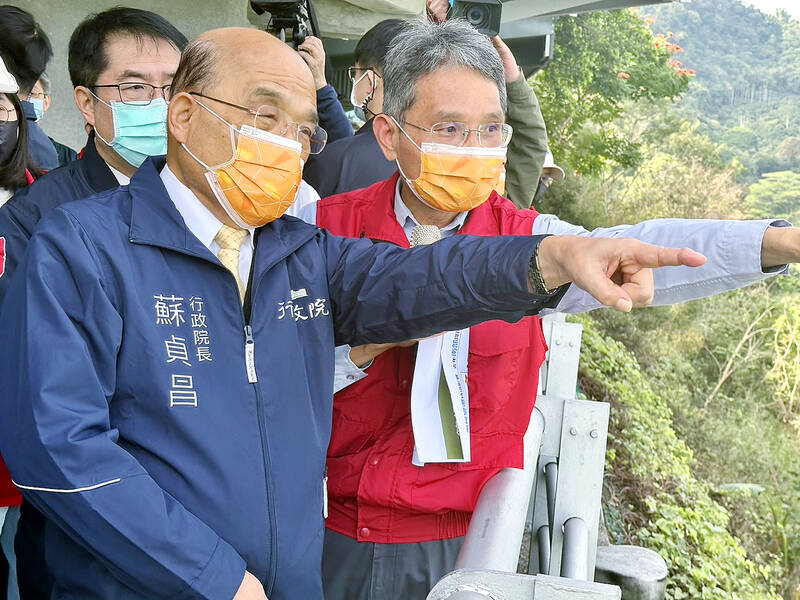The government plans to give each Taiwanese a one-off cash payment of NT$6,000 (US$195.35) as a rebate from what has been described as surplus tax revenue, Premier Su Tseng-chang (蘇貞昌) said yesterday.
The government would keep NT$40 billion of the NT$180 billion in surplus tax revenue in reserve and share the rest with the public, Su told reporters in Chiayi County.
With the aim of “sharing the nation’s economic achievements with all citizens, young and old,” each Taiwanese would be given NT$6,000, Su said.

Photo: Tsai Tsung-hsun, Taipei Times
It remains unclear whether foreign nationals residing in Taiwan who have paid taxes to the government would be included in the rebate plan.
Asked about the matter, the Cabinet did not provide any details, saying only that “planning is ongoing.”
Su said that the government aims issue the cash payment shortly after the Lunar New Year holiday from Jan. 20 to 29.
The Cabinet would have to send the plan to the legislature for approval.
Given repeated calls by legislators across party lines for the surplus tax revenue to be returned to the public, the legislature is likely to make a decision soon after the Cabinet submits its proposal.
However, lawmakers are split on when they should review such a plan. The legislature’s regular session has been extended to Friday next week to give lawmakers more time to review the central government’s proposed general budget for this year.
While Chinese Nationalist Party (KMT) lawmakers have said that a provisional session should be held from Jan. 16 to 20 to discuss the matter, Democratic Progressive Party caucus whip Ker Chien-ming (柯建銘) said it was better to do so in the next session, which is to begin before the end of next month.
Su’s announcement followed a policy reversal by President Tsai Ing-wen (蔡英文), who, despite earlier ruling out any imminent plans to give the surplus back to the public, on Tuesday promised a rebate plan.
The Ministry of Finance estimated that last year’s tax revenue could exceed the amount budgeted by NT$450 billion after the central government collected more than NT$3 trillion in tax revenue in the first 11 months of last year.
The government would spend most of the NT$450 billion on initiatives, such as closing financing gaps in the Labor Insurance and National Health Insurance funds, and subsidizing electricity prices, the Presidential Office said in a statement after a meeting on Saturday.
The government would also distribute NT$70 billion of the total to local governments, while leaving a reserve of NT$180 billion that would be “shared with the people,” the statement said.
Also yesterday, Su said that the Cabinet has extended the monthly living allowance of NT$750 and NT$500 for individuals in low and middle-to-low income households until the end of this year.
The Ministry of Health and Welfare would coordinate with local authorities to ensure eligible recipients receive this month’s allowance before the Lunar New Year holiday, he said.
As part of the government’s COVID-19 relief measures, the monthly payments were given on top of other allowances.
The program, which was originally scheduled to run until last month, benefits about 620,000 households, the ministry said in March last year, when it was launched.

The Central Election Commission has amended election and recall regulations to require elected office candidates to provide proof that they have no Chinese citizenship, a Cabinet report said. The commission on Oct. 29 last year revised the Measures for the Permission of Family-based Residence, Long-term Residence and Settlement of People from the Mainland Area in the Taiwan Area (大陸地區人民在台灣地區依親居留長期居留或定居許可辦法), the Executive Yuan said in a report it submitted to the legislature for review. The revision requires Chinese citizens applying for permanent residency to submit notarial documents showing that they have lost their Chinese household record and have renounced — or have never

A magnitude 5.6 earthquake struck off the coast of Yilan County at 12:37pm today, with clear shaking felt across much of northern Taiwan. There were no immediate reports of damage. The epicenter of the quake was 16.9km east-southeast of Yilan County Hall offshore at a depth of 66.8km, Central Weather Administration (CWA) data showed. The maximum intensity registered at a 4 in Yilan County’s Nanao Township (南澳) on Taiwan’s seven-tier scale. Other parts of Yilan, as well as certain areas of Hualien County, Taipei, New Taipei City, Taoyuan, Hsinchu County, Taichung and Miaoli County, recorded intensities of 3. Residents of Yilan County and Taipei received

Taiwan has secured another breakthrough in fruit exports, with jujubes, dragon fruit and lychees approved for shipment to the EU, the Ministry of Agriculture said yesterday. The Animal and Plant Health Inspection Agency on Thursday received formal notification of the approval from the EU, the ministry said, adding that the decision was expected to expand Taiwanese fruit producers’ access to high-end European markets. Taiwan exported 126 tonnes of lychees last year, valued at US$1.48 million, with Japan accounting for 102 tonnes. Other export destinations included New Zealand, Hong Kong, the US and Australia, ministry data showed. Jujube exports totaled 103 tonnes, valued at

BIG SPENDERS: Foreign investors bought the most Taiwan equities since 2005, signaling confidence that an AI boom would continue to benefit chipmakers Taiwan Semiconductor Manufacturing Co’s (TSMC, 台積電) market capitalization swelled to US$2 trillion for the first time following a 4.25 percent rally in its American depositary receipts (ADR) overnight, putting the world’s biggest contract chipmaker sixth on the list of the world’s biggest companies by market capitalization, just behind Amazon.com Inc. The site CompaniesMarketcap.com ranked TSMC ahead of Saudi Aramco and Meta Platforms Inc. The Taiwanese company’s ADRs on Tuesday surged to US$385.75 on the New York Stock Exchange, as strong demand for artificial intelligence (AI) applications led to chip supply constraints and boost revenue growth to record-breaking levels. Each TSMC ADR represents